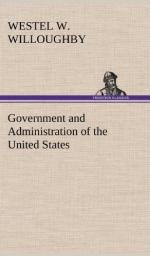_#Democracy.#_—A pure democracy is a government in which all the people rule directly, meeting in popular assemblies in which is determined by the votes of the majority how the government is to be administered. This form of government is obviously possible only in very small communities. Several of the Grecian states governed themselves after this manner. No perfect example of a nation with this form of government can be said to exist at this time. The nearest approach to pure democracy is found in certain cantons of Switzerland. The Roman historian Tacitus tells us that the early Germans governed themselves in a purely democratic manner, and the first governments of several of our American colonies were of the democratic type. When we come to the study of local government in the United States we shall see the democratic form followed in the New England Town Meetings.
_#Republic.#_—A republic is a democracy adapted by means of the introduction of the representative principle, to the government of a large and widely separated people. Under this form of government the people rule themselves, not directly, as in a democracy, but through agents or representatives of their own selection. The participation of the people in their own government consists therefore merely in the choice of officers to represent them and carry out their wishes. There exist at present several republics, the tendency seeming to be for nations to approach more nearly this form of government. France has been, since 1870, the best European example of a republic. Our own government—the United States of America—is to us the most interesting and important example of a republic.
_#Popular Government.#_—By the word ‘popular’ is meant, of or by the people, and by popular government is to be understood a government in the administration of which the people as a whole participate. Every change by which new and greater political powers are given into the hands of the common people is considered a step towards the full realization of popular government. During the last one hundred years great strides have been made in this direction by all European nations except Turkey and Russia. The extent to which this movement towards popular control of government can be safely and successfully carried is a question of very great importance. To a very large extent it depends upon the intelligence, previous training, and natural political ability of the people who are to be entrusted with their own government.
CHAPTER III.
The Functions of Government.
Broadly speaking, the functions performed by government are of a threefold order: the establishment, interpretation, and enforcement of laws. A division of government into three branches is thus called for: the legislative, the judicial and the executive. The manner in which these departments are related to each other, the extent to which they are vested in the same hands, and the degree in which they are separate from each other and independent in their workings, differ in different countries. In England, as we have seen, the executive and legislative functions are closely united. In our government, as we shall see when we come to consider its structure, complete independence of the three departments has been aimed at.




